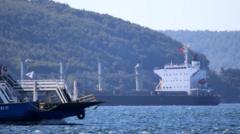After returning to Turkey to cover anti-government protests following the arrest of Istanbul's mayor, BBC correspondent Mark Lowen was detained and subsequently deported. His experience sheds light on the broader climate of press restrictions in Turkey, as well as the public's demand for democracy amid an increasingly authoritarian regime.
BBC Correspondent Mark Lowen's Unfolding Ordeal: From Covering Protests to Deportation in Turkey

BBC Correspondent Mark Lowen's Unfolding Ordeal: From Covering Protests to Deportation in Turkey
Mark Lowen's unexpected deportation from Turkey highlights the tension between press freedom and government authority amidst ongoing protests for democracy.
On a seemingly ordinary day, BBC correspondent Mark Lowen found himself at the center of a serious political incident in Turkey. Just moments after expressing joy to return to a country where he previously resided, Lowen received a phone call from his hotel receptionist requesting him to meet due to an "urgent matter." Upon arrival, he was confronted by three plain-clothed police officers who demanded his passport and began to escort him away, attempting to shield the situation from the media.
Having spent three days in Istanbul covering protests linked to the controversial arrest of mayor Ekrem Imamoglu, it became evident that his reporting had drawn the attention of the authorities. Initially held at police headquarters for seven hours, Lowen noted a surprisingly amicable atmosphere, with some officers expressing personal disagreement with the government's stance. However, as he was transferred to a custody unit, the situation escalated, and access to legal support was restricted. He was informed that he was being deported for being a "threat to public order," but without credible justification for the claim.
Despite his ordeal lasting nearly a full day and leading to a one-way flight back to London, Lowen was grateful his situation was managed with the assistance of BBC management and the British Consulate. His narrative underscores the grim reality for many journalists in Turkey, where restrictive laws and governmental crackdowns have made it increasingly perilous to report critically on state matters.
The protests that sparked Lowen's deportation serve as a reflection of a larger struggle in Turkey against an oppressive regime, particularly after Imamoglu’s arrest. President Erdogan's administration has branded the protests as "street terrorism," and amid a politically charged landscape, Lowen's experience underscores the challenges media faces in reporting on democracies under threat. The protests symbolize a burgeoning appeal for democracy, but the pressing question remains: can these demonstrations sustain their momentum, or will Erdogan quell dissent and maintain his stronghold on power?



















